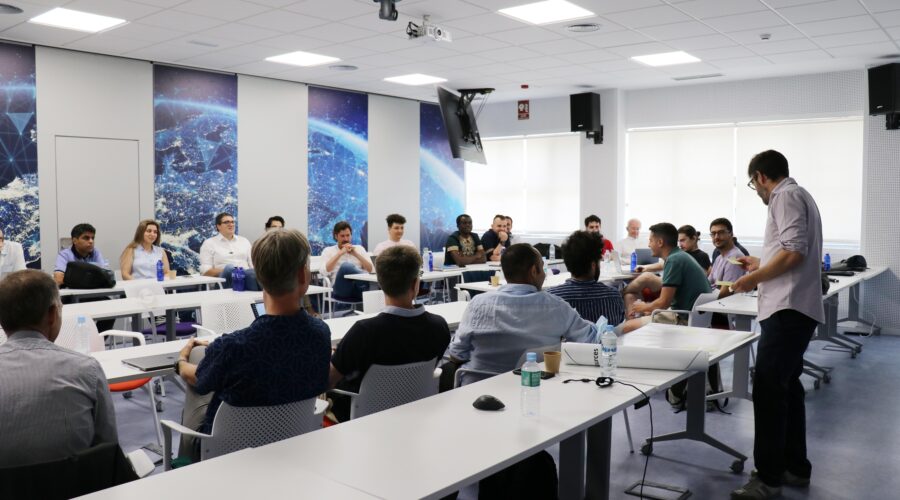IMDEA Networks

Annual Workshop 2022: Time to share knowledge
Executive Summary from the Workshop Chair of the Annual IMDEA Networks Workshop 2022
19 July 2022

During the 12th Annual IMDEA Networks Workshop held in Madrid on 8 June 2022, several renowned experts delivered keynotes and participated in panels to assess where networking research is heading in the future.
It was recognized that network research has a proud and mature trajectory that is central to the process of paving the way for future research in the area. On the one hand, new mechanisms like those based on quasi-optimal admission control schemes can change the way to predict the best performance in access links (both wired and wireless) in the presence of a mix of services like video, audio, web, and gaming. On the other hand, legacy network design choices are no longer a thing that will drag evolution down. The software-ization of the internet will soon unleash its potential to adapt networks to new frontiers. In particular, with the arrival of software-defined networking (SDN) we see how network protocols and their management evolve to adaptatively meet the needs of new technology and the demand of the users.
This trajectory has built stepping stones for delivering new networked systems and algorithms, advances around wireless networking, together with methodologies to conduct internet measurements key to understanding existing privacy and security issues. Important research remains to be done along multiple dimensions.
First, overlay networks running on top of the existing Internet offer new opportunities for fair, trustworthy, and democratic data exchanges that will shape the way data owners connect with data customers. These new opportunities will foster research that will answer existential challenges of a new data economy such as how to protect ownership rights in the digital era.
Second, we see fierce competition for limited resources, with uncoordinated users seeking equilibrium while paying for the price of anarchy. This calls for both adaptive and resilient communications, where new mechanisms to absorb and recover from failure while learning from experience.
Third, devising novel data-driven strategies to select among the most appropriate set of policies when scheduling heterogeneous users in diverse contexts will offer the network community the means to provide optimality proofs for unlimited settings.
Fourth, the virtualization of radio access will bring new opportunities, especially in the presence of quantum for wireless communications. This may or may not enable the research community with the mechanism it needs to explore the limits of machine learning.
Fifth, the intersection between communications and sensing, especially around millimeter waves and multi-band spectrums, will open opportunities for new applications like intelligent reflective surfaces or new designs for unconventional low-power transceivers.
Sixth, URLLC redundancy will enable modeling systems so that the optimal scheme can be at least searched and possibly optimized analytically. This will prompt new research around the impact of metrics and the cost of MTC overflow to URLLC.
Seventh, there are research opportunities around the detection and localization of unauthorized emitters, while preserving the privacy of the users just using low-cost and programmable IoT devices; as well as groundbreaking research on designing battery-free IoT networks.
Eighth, there is tangible and invested interest from the research community to devise data-driven solutions around (mobile) networks, including the use of machine learning and artificial intelligence for network operations or beyond-networking applications like for answering socio-demographic questions.
All the above will not be up to its importance without understanding the user experience, which is a research discipline that deals with subjective assessments that need better mechanisms to obtain accurate personalized results. This also includes practical metrics capable of complementing the theoretical properties by measuring the age of the information in the edge.
We are yet to see the advent of trustworthy systems as challenges behind digital identities are being investigated. At the same time, it has been recognized that security and privacy are an integral part of the future of networking and that issues like Zoombombing although they were thought to be solved already during the second wave of the pandemia (Ling et al, IEEE S&P’21) are still a present threat. Furthermore, quantum computing and quantum communications will have a significant impact on different lines of networking research which include networking for quantum computing and quantum networking.
For all the above reasons, networking research, whether on core access links, on the software-ization of the protocols, or in the application of protocols to new network-based economies, has a bright future ahead of it.
In the last event of the day, the alumni shared some wise thoughts about making choices after PhD and building a successful career. It is identified that, apart from academia, networking researchers have great opportunities in the industry, including startups, and the PhD students are encouraged to think about their own startups.
Dr. Guillermo Suarez-Tangil, Research Assistant Professor, IMDEA Networks Institute – https://suarez-tangil.networks.imdea.org/
Workshop Chair, 12th Annual IMDEA Networks Workshop – https://networks.imdea.org/whatsnew/events-agenda/12th-imdea-networks-annual-international-workshop/


Recent Comments